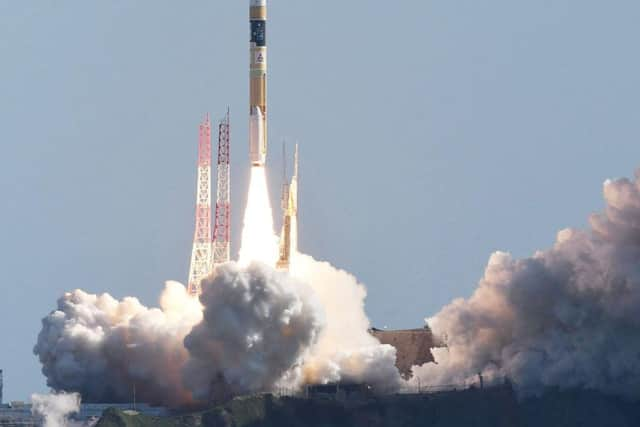Space race: Could the new quest to reach the Moon led by India and Japan bring opposing nations together?
When Professor Fiona Henriquez stood on a Florida beach in November last year, watching one of her experiments blast off from NASA’s Kennedy Space Centre in a rocket destined for the International Space Station, she found herself getting uncharacteristically emotional.
"I’m a scientist and I usually have my feet firmly on the ground, so I never thought [that reaction] would happen to me,” says the professor of parasitology and associate dean for research and innovation at the University of the West of Scotland.
Advertisement
Hide AdAdvertisement
Hide Ad"Space is something I’ve always been fascinated by. There's been this massive gap since the 1960s, when we had the first moon landing and now – and I've grown up saying ‘why did we never go back?’ It’s intriguing.”


In recent months, international space programmes have begun a renewed focus on “going back” to the moon. Commercial companies are pouring increasing investment into the use of space technology such as satellites and commercial launches.
On Thursday, Japan made a bid to become the fifth country to land on the moon after a successful rocket launch carrying the X-Ray Imaging and Spectroscopy Mission satellite, a joint project between the Japanese, American and European space agencies. This comes two weeks after India became the fourth country to make a moon landing after the US, Russia and China – and just days after Russia’s first moon mission in 50 years failed after the Luna-25 craft crashed after spinning into an uncontrolled orbit.
India’s successful landing, on the moon’s south pole, will allow scientists to carry out analysis and testing to try to uncover important reserves of frozen water and precious elements. If Japan’s rocket lands successfully in February, it will demonstrate the ability to land a low-cost, lightweight spacecraft. However, the nation’s space programme has twice failed to reach the lunar surface in the past year.
Meanwhile, there is NASA’s Artemis project – a robotic and human moon exploration program run in collaboration with private spaceflight companies and space agencies from not only traditional space partners such as India, Canada, Japan, and the UK, but also emerging space powers from Brazil, South Korea, Mexico and the United Arab Emirates. The aim is to land the first woman and first person of colour on the moon, in what would be the first human moon landing since 1972.


"I feel that there is a lot of intrigue with what is up there, and it definitely is driving people's imagination, especially our younger generation,” says Prof Henriquez. Her project with PhD student Daniel Raimbach, on the biological changes in worms in space, was launched into space as part of a mission to send supplies, equipment and science investigations to crew on board the International Space Station. The launch was carried out by Elon Musk’s commercial SpaceX company for NASA.
Prof Henriquez says the need to find additional resources in a bid to combat climate change is one of the main drivers of the international desire to explore outside of the Earth’s orbit.
“We need to find that alternative resource,” she says. “So moving outside, and looking in space exploration, and tapping into to the moon and maybe other planets in the future, I think this is all going to help us advance our technologies. We become more resilient and we protect our environment. "
Advertisement
Hide AdAdvertisement
Hide AdProf Patrick Harkness, from the James Watt School of Engineering at the University of Glasgow, is looking one step further – towards humans living on the moon.
“Quite a lot of [lunar exploration] is geared towards In-Situ Resource Utilisation,” he says. “This is essentially going to the moon and trying to determine and demonstrate that we can use resources that are already on the moon to reduce the amount of resource that we'd have to bring from the Earth to the moon in future if we have a sustainable presence there.”
He explains how scientists want to look more closely at lunar regolith – the soil that covers the moon’s surface – and see if it can be separated out to allow the extraction of water, elements such as hydrogen and oxygen, or even metal.
"These are things that we'll be able to use on the moon rather than having to bring them from Earth, so it is a much more energy efficient way of creating a sustainable presence,” he says.
But he points out inhabiting the moon could cause conflict between Earth nations. The countries which have already made moon landings – most notably the US and Russia – are not close allies.
"Technically it's possible, it's a question of making a political decision that this is what we're going to do,” he says. “If you're going to have an international partnership to do this, then you're going to have to have a set of rules and relationships. Overlaid upon that is what responsibilities that consortium might have to the wider community, who might have competing interests in the moon and what form you use to settle those disputes.
"Getting these things set up about what we're doing and what rules are we going to follow when we go there, all of this is starting to crystallise a little bit. But that has to happen before you can start delivering the technical things.”
However, Prof Harkness says he believes a drive by multiple nations for further space exploration, including putting more humans on the moon, should be welcomed as an opportunity for global collaboration.
Advertisement
Hide AdAdvertisement
Hide Ad"Doing things like that is hugely inspiring,” he says. “This type of activity shows you what's possible and how people can achieve the most remarkable things – and what could possibly be more remarkable than going to the moon? It's a colossal achievement.
"I am aware that sometimes you get pushback, such as 'what's the cost of doing things like this, when there's problems to be solved on Earth?’
"But the important part to remember is that the investment in space is not being spent in space, you're making investments in the Earth. You're investing in high-quality jobs that are delivering the most remarkable inspirational things and the money is being spent right here on Earth.”
Comments
Want to join the conversation? Please or to comment on this article.
